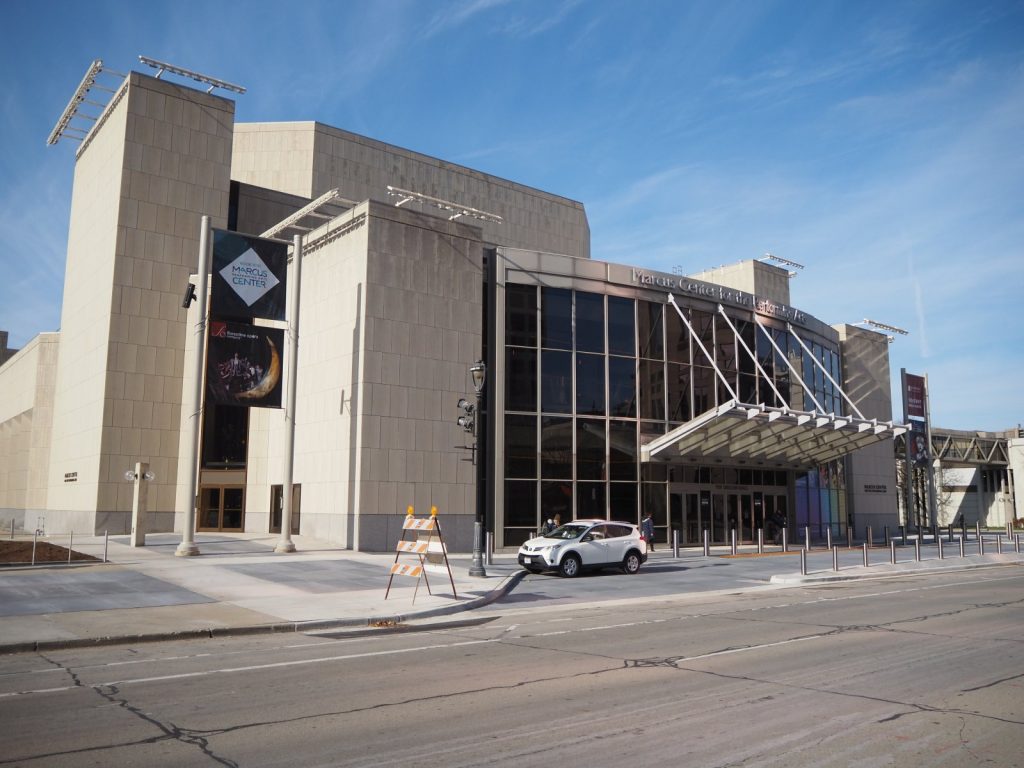Marcus Center Seeks Extended County Support
County subsidy to end next year. Marcus Center seeks support through 2030.

Marcus Performing Arts Center. Photo by Jeramey Jannene.
The Marcus Performing Arts Center (MPAC) is seeking a new agreement with Milwaukee County that will extend its public support until 2030, providing the institution more time to become self-sustaining.
The center, located at 929 N. Water, is owned by the county and leased to MPAC, which is in charge of operations and even funds much of the maintenance. In 2016, the county and MPAC negotiated an off-ramp to eventually make the center privately owned and funded, with a gradual stepping down of taxpayer support. County support was supposed to end in 2025, but, due to some circumstances that aren’t entirely within MPAC’s control, the center isn’t ready to stand on its own.
First, the COVID-19 pandemic closed the center for 18 months, then in 2021 the Milwaukee Symphony Orchestra left the facility for its new orchestra hall, taking $1 million in annual revenue with it. When the new CEO Kevin Giglinto took over in 2023, he found an organization struggling with annual budget deficits and spending down its annual cash reserves, which are on track to be completely depleted by the end of this summer.
Last year, Giglinto wrote a letter to the Milwaukee County Board of Supervisors explaining that the institution needed to preserve its funding relationship with the county for a bit longer, as it transitioned to self-sufficiency. This month supervisors will vote on an amendment to the plan that continues providing operating support to MPAC, slowly stepping it down until 2030. In total, between operational support and infrastructure costs, taxpayers would provide an additional $3.3 million between now and then.
“I believe we can come up with a plan in that period of time that will leave us completely self sustainable,” Giglinto told Urban Milwaukee.
For more than a decade now, the county has been restructuring its relationship with various cultural institutions. In some cases, the institution is driving the change, as in the case of the Milwaukee Public Museum. Last year the county negotiated a deal severing, and privatizing, the Charles Allis and Villa Terrace Museums.
Despite seeking an extension, MPAC is also already seeing improvement in its long-term financial outlook, Giglinto told Urban Milwaukee. For starters, after he stepped into the role, MPAC has launched an annual fundraising program, asking audience members and season ticket holders to donate.
“The frequency of attendance has a very high correlation with the likelihood of someone to give,” Giglinto said. “And if you make a compelling ask, that points to the impact you’re having, the kind of support you need, people do step up and they support you.”
The next biggest source of revenue growth comes from Broadway. After losing the Milwaukee Symphony, the organization has sought to bring more Broadway road shows to the Marcus Center, and that has driven a “meaningful increase” in revenue, Giglinto said.
More than half of the audience for these shows is coming from outside of Milwaukee County, and a significant percent are coming from Cook County, Illinois, Giglinto said, meaning from the Chicago area.
MPAC has worked out a deal with the county for extended operating support that would provide $450,000 each year in 2026 and 2027, $400,000 in 2028 and $225,000 each year in 2029 and 2030. It would also provide a $2.3 million in funding for infrastructure needs and maintenance by 2028.
The Marcus Center is approximately 56 years old. It was built in 1969 with private funding and deeded to the county to be held in public trust. During the past decade, the county has provided approximately $10 million in funding for infrastructure and maintenance at the building. During that same period, MPAC has invested approximately $16 million, Giglinto said.
Giglinto said he understands the competing needs placed on the limited resources the county has, but said he thinks the proposal is “incredibly reasonable” when considering the economic impact of the Marcus Center compared to the gradual step-down of taxpayer support over the next five years.
If county policymakers, ultimately, don’t approve the deal, “that would force some pretty difficult choices,” Giglinto said.
Legislation Link - Urban Milwaukee members see direct links to legislation mentioned in this article. Join today
If you think stories like this are important, become a member of Urban Milwaukee and help support real, independent journalism. Plus you get some cool added benefits.
MKE County
-
Budget Deficit Fallout Grows, Head of MCTS Resigns
 Jul 8th, 2025 by Graham Kilmer
Jul 8th, 2025 by Graham Kilmer
-
Parks Committee Backs $30 Million Domes Deal
 Jul 8th, 2025 by Graham Kilmer
Jul 8th, 2025 by Graham Kilmer
-
Federal Judge Recommends Dugan Case Go To Trial
 Jul 8th, 2025 by Graham Kilmer
Jul 8th, 2025 by Graham Kilmer






















This is sad to hear. I get that circumstances have changed with Covid and the symphony leaving (announced in 2016 about eight months after the current funding arrangement was approved. Leadership has also changed. Paul Mathews was CEO of the Marcus Center and Chris Abele was county exec—for context. Nonetheless, it is disappointing—but I guess expected—that the Marcus Center waited until this year to bring up extending payments for another five years. I mean, everyone knows the County is hardly in solid financial shape. Taxpayers gonna pay…
What has also changed is the potential future ownership of the Marcus Center. Back in 2015, the legislation signed by Governor Walker funding what was to become Fiserv Forum included a provision for the Marcus Center to come under Wisconsin Center District ownership.
https://www.jsonline.com/story/news/local/milwaukee/2016/03/07/milwaukee-county-panel-backs-resuming-payments-for-marcus-center/84877590/#:~:text=Don%20Behm,total%20more%20than%20$9.8%20million.
Abele wanted it and so did many at the state level—thinking that would be a good way to arrange better support for both the Milwaukee (Miller High Life) Theatre and the Marcus Center. Upon further consideration, the Wisconsin Center District declined this plan in 2018.
I wonder what the Marcus Center would be like today if that had happened. Did the Wisconsin Center District dodge a bullet?
Oh, and, as a Cook County, IL, resident, I totally get why we would come to Milwaukee for a show and have been thinking of starting to do that regularly, myself—for Broadway, the Rep, MSO, etc. While Chicago and Milwaukee might get different casts and set designs for Broadway shows, productions are the same and visiting MKE for a night or a weekend is always a treat. I’ve had friends got to MKE for big concert tours at American Family Field and Fiserv simply to get a better shot at less expensive tickets and just a nicer experience overall. Always nice to get out of town…
While COVID was an unpredictable event, the MSO’s leaving was known for years and shouldn’t be an excuse for the current financial challenge.
The Marcus Center is the third largest arts organization/presenter in Milwaukee. It has become our biggest venue for local Broadway show tours, which is extremely important for local audiences and more so in terms of tourism in Milwaukee. Recent enhancements made to the season lineup have generated even more interest, at a time when funding for the arts is at historic lows. When you add in the amount of related spending on restaurants, bars, hotels, and other area attractions that a Broadway series can bring to MKE, I believe the investment is worth it.